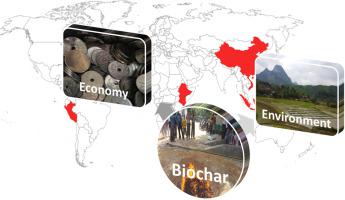Science of the Total Environment ( IF 8.2 ) Pub Date : 2020-09-22 , DOI: 10.1016/j.scitotenv.2020.142455 Mikołaj Owsianiak , Henrik Lindhjem , Gerard Cornelissen , Sarah E. Hale , Erlend Sørmo , Magnus Sparrevik

|
The feasibility of using biowaste for the production of biochar and its use in agriculture depends on its environmental and economic performance. This paper quantifies environmental and economic life cycle impacts of biochar production and agricultural use in six developing and middle-income countries (Ethiopia, Indonesia, Kenya, Peru, Vietnam, and China). Two types of production technologies typical for rural and urban areas were investigated (flame curtain kiln and gasifier, respectively), and comparisons were made with composting (either home composting or windrow composting) as alternative biowaste management systems. The results showed that both pyrolysis systems performed better than composting and both were expected to bring environmental benefits. The largest environmental benefits were observed for the gasifier systems, mainly due to the substitution of electricity production from the grid. Damage to ecosystems and human health ranged from −1 × 10−7 to −2 × 10−8 species×yr and from −1 × 10−5 to −5 × 10−6 DALY per kg of biowaste treated, respectively (negative scores indicating environmental benefits). However, net economic benefits were only achieved when low-cost simple kilns were used in countries with low labor cost, like Ethiopia, Kenya and Vietnam (net profit from 0.01 to 0.08 USD per kg of biowaste treated). Further, high investment and operating costs and relatively small electricity revenue from substituting the grid electricity resulted in gasifier scenarios being economically unsustainable (net loss from 0.29 to 1.58 USD per kg of biowaste treated). Thus, there are trade-offs between positive environmental impacts for society and net market loss for the individual decision-maker (company or individual farmer) that should be considered when making decisions regarding the implementation of biochar technology in developing and middle-income countries. The use of simple kilns in countries with relatively low labor costs appears to be favorable.











































 京公网安备 11010802027423号
京公网安备 11010802027423号